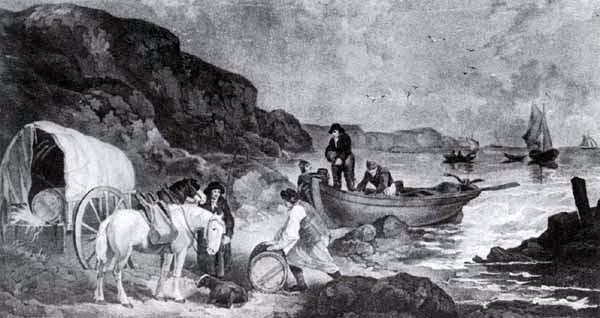5. In the dead of night the smugglers work…

The graveyard of St James’ Church, beneath the Castle Hill, was the scene of that night’s run. There, in the blackness of night, a single lantern cast its yellow light over crazy-leaning tombstones and on the soft carpet of grass and the pale gold of fallen leaves.
“Keep moving, my lads,” John Fagg said quietly.
In continuous procession they came up from the sea, treading silently along the boards which the ‘free-trader’ had caused to be laid over the betraying shingle, their passage seldom heard unless, further inshore, one chanced to step on a twig, or acorn, or fir cone.
“Four hundred dollops passed,” the checker, one of Mr Fagg’s clerks, murmered without looking from the book in which he made the tally.
“Very good,” the shipowner observed evenly.
He was standing on a rickety, box-like tomb, staring beyond the Ropewalk and harbour to the southward where, past Archcliffe Point, down towards the base of Shakespeare’s Cliff, he could see many moving lights. From there also came many a shout as Valentine Pepper and his half-score of self-chosen dare-devils acted decoy, giving Mr Toke and the Preventivemen plenty of exertion at least.
“Five hundred, sir,” the report came.
Still they came up from the boats, looming into the light and then vanishing quickly into the darkness towards the waiting carts. Some portaged casks of brandy, ready slung, but the majority bore dollops of tea, ex Scheveningen, canvas-sewn packages each containing forty pounds nett weight.
“Ah!…” the shipowner ejaculated.
From a third of the way up the more accessible slope of Shakespeare’s Cliff a blue light thrice swung widely, and then fell in an arc towards the beach as Captain Pepper, having done all that he could, got rid of the lantern and began to think of his own safety.
John Fagg dropped off the tombstone and, after inquiring how much tea still remained, made a quick calculation. He reckoned he had eight minutes left.
“Right,” he said briskly, “bring the lot up, and then… every man away.”
Down to the sea he next went, until thigh deep he was standing by the nearest boat. Sixty casks of brandy were as yet waterborne.
“Can’t do them,” he decided. “We’ll have to sink ’em here, old Diddlum, and recover later.”
“Aye, aye, Mr Fagg,” came the confident response from the inky gloom.
The free-trader gave final instructions. “Small sinkers,” he ordered. “Twelve foot o’line with cork markers. Let ’em go half a cable out.”
Only the spirits of the dead were in the quiet churchyard of St James’s when Mr Toke and his men arrived. But there was a trail of tea from a punctured dollop, and a two-way track of planks as evidence of a large and carefully-planned run.
“Looks like Fagg again, sir,” Clement Foxley panted.
The enraged Revenue Officer made no reply. There still might be stragglers about and if one of these could be taken it might be possible to pin on to Fagg…
“Matson, Barley, Cutson and Broome,” he snapped. “You four will take – – -”
There was a startled oath and a yell of terror. Before Mr Toke knew what was about, his men were flying in every direction, with a mortally affeared Assistant diving straight into a tombstone as well.
There was, perhaps, excuse. It was, after all, a graveyard at dead o’night, and a piece of white-painted canvas cut in the shape of a human, suspended from a low branch and weighted at the bottom, can be a most alarming sight when, in such circumstances, it is swayed eerily by a puff of wind.
Ten minutes passed before Ralph toke collected together the men under his command.